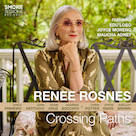

Renee Rosnes: Crossing Paths
Smoke Sessions Records
Whereas many a North American jazz listener enters the portal of Brazilian music via Antônio Carlos Jobim, the pivotal moment for pianist Renee Rosnes was hearing Wayne Shorter's 1975 album Native Dancer, the saxophonist's iconic collaboration with Milton Nascimento. The sultriness of the music and seductive allure of his voice captivated the pianist and prompted her to seek out in turn other Brazilian greats, including Elis Regina, a beloved singer who died at thirty-six. Reflecting on the indelible impact her music had on the pianist, Rosnes acknowledges that she discovered many of the songs and composers on Crossing Paths through Regina's recordings.
The album title suggests crossover, and it is definitely that, not only in its beguiling blend of American jazz and Brazilian rhythms but in bringing together greats from both genres, singers Edu Lobo, Joyce Moreno, and Maucha Adnet, guitarist Chico Pinheiro, and percussionist Rogério Boccato on the one hand and saxophonist Chris Potter, trombonist Steve Davis, bassist John Patitucci, and drummer Adam Cruz on the other. Lobo and Moreno are also credited as composers alongside Jobim, Nascimento, Gilberto Gil, Egberto Gismonti, and Caetano Veloso. Enhancing the performances too are contributions from flutist Shelley Brown, a longtime member of the Canadian Opera Company Orchestra and National Ballet of Canada Orchestra.
The album opens on a high with a breezy take on Gismonti's “Frevo,” with Brown, Rosnes, and Pinheiro elevating the rendition with fleet-fingered soloing and unison playing. On electric bass, Patitucci animates the pulse as Pinheiro and Cruz stoke controlled fire and the front-liners dazzle with radiant flourishes. Rosnes's comment that Gismonti's music pulls the both player and listener “into a strong vortex of energy” is well-supported by the performance.
Delivered at a slow and sultry tempo, Lobo's “Pra Dizer Adeus” is distinguished by a transporting vocal from this ageless eighty-one-year-old but also a wordless one from Rosnes, who sings along with her improvised piano solo on this enrapturing exercise. Lobo returns for a breathless take on his “Casa Forte,” n otable also for a towering soprano solo from Potter and an equally nimble one from Rosnes. Five years younger than Lobo, Moreno guests on her “Essa Mulher,” which segues from an affecting piano-and-voice intro to a delicate ensemble episode accentuating the splendour of her voice. Adnet, who spent ten years singing with Jobim and his Nova Banda, imprints her indelible stamp on Jobim's “Canta, Canta Mais” (which translates as, “Sing, Sing More”), which is also memorable for Patitucci's bowed shadowing of her vocal and Brown's lustrous flute. The ache and vulnerability of Adnet's voice makes the album's closing take on Jobim's “Caminhos Cruzados” (which, appropriately, translates to “Crossing Paths”) a strong and memorable takeaway.
Strong instrumental performances are present too. Veloso's “Trilhos Urbanos” is vividly introduced by Rosnes on melodica before the pace accelerates for an infectiously swinging evocation of the bustling streetcars of his Bahia hometown, Santo Amaro. Replete with powerful statements from Davis and Pinheiro, the tune's also sweetened with a soulful piano solo and electric piano shadings from the leader. Elsewhere, Nascimento's “Estórias da Floresta” exudes the sing-song character of folk tale, while the grooving run-through of Gil's “Amor Até O Fim” grants Potter a chance to flex his tenor muscles, which he handsomely does alongside concise round-robin turns by Pinheiro, Davis, and on Fender Rhodes Rosnes.
Crossing Paths is the first full-album project she's devoted to Brazilian music, but it's not the first time she's breathed in its replenishing air. Her 1996 album Ancestors included Lobo's “Upa Neguinho,” and three years later Gismonti's “Sanfona” graced Art & Soul. Jobim's also figured into her discography, with his “Double Rainbow” and “Modinha” appearing on Double Portrait (2010) and Manhattan Rain (2012), respectively. Put simply, Rosnes is no dabbler but rather someone deeply connected to a music she loves and respects, and it wouldn't be overstating it to call Crossing Paths a recording she's worked towards for three decades. Produced by her and Paul Stache, the intoxicating set was recorded at NYC's Sear Sound Studio C, but its heart and soul are very much in Brazil. It is both a major accomplishment by Rosnes and a high watermark in her career.May 2025